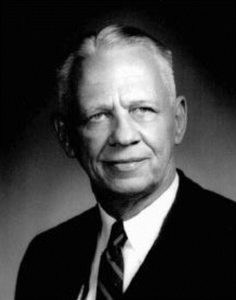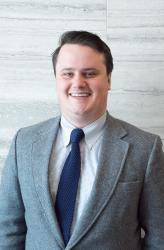Willmoore Kendall defied the norms of many mainstream intellectual movements. Those who knew him recall a “typical strangeness” that characterized the man and his works. He was a solitary figure who has been largely forgotten in today’s conservative conversations. But, nonetheless, Kendall’s radically original ideas need to be rediscovered just as he was a “rediscoverer of the historic American political orthodoxy.” And what better time to engage his work than this, the fifty-second anniversary of his death.
Willmoore Kendall Jr. was born in 1909 in Konawa, Oklahoma, the son of a blind itinerant Methodist preacher, graduated high-school at the age of 13, earned a B.A. from the University of Oklahoma at 18, a M.A. Northwestern at 19 from and was named a Rhodes Scholar to Oxford at 21. In Europe he became enamored with the Trotskyite form of communism and much of his early scholarship is littered with Marxist praise for planned economies, world revolution, and state intervention (such as government control of the press.) For example, he proclaimed that his “purpose in life was to become a great Socialist Publicist.” Even though he would later realize the error in his leftist dalliances, his central concern would always be with the defense of democracy and the rights of the people against elites. As a leftist, he feared the bastardized class scarecrow of Marx’s bourgeoisie while as a conservative he warned of the prying fingers of an all-knowing and ever-encroaching administrative state.
What turned Kendall away from the path of other prominent Americans leftists was his experience as a journalist in 1930s Spain. Historian George Nash would say after Kendall’s death that:
In the turbulent cockpit of Spanish political warfare, Kendall’s detestation of Stalin and the Moscow-oriented Communists grew. The dictatorial, totalitarian, anti-democratic aspects of Communism appalled him. He later told a friend that as Spain slid toward civil war he could tolerate the ‘Communists’ blowing up the plants of opposition newspapers. But when they deliberately killed opposition newsboys-this was too much!

It was then that Kendall realized the lengths that his communist “comrades” would go in order to achieve their ends: even if that meant throwing out the basic tenets of morality. He would later say that “They [the communists] are incapable of participating in a democratic government.” He saw that the underlying philosophy of communism (and of socialism in general) with its focus on revolution and usurpation of property rights was fundamentally incompatible with democracy, and particularly mismatched with the nature of the American republic. He fundamentally believed “that abrogation of the rights of property, save as this may be clearly necessary for the purposes set forth in the Preamble to the Constitution, is theft, and thus a violation of natural law,” and, a violation of the very nature of American society. “This theme –militant, uncompromising hostility towards Communism –became one of the dominant features of his thought.”
Kendall would eventually return to the States and receive his Ph.D. in Political Science from the University of Illinois writing his dissertation which would eventually become his only long book, John Locke and Majority Rule (1941). Within its pages he would explore and attempt to reconcile the contradiction between of democracy (that the people can do whatever they want) and liberty (certain rights are natural and guaranteed against everything, including from the majority of the people.) Kendall was a firm believer that democracy could function while both preserving the majority and the liberties of the individual.
Under the assumption that he was a generally left-leaning intellectual he was hired by Yale University (much to their surprise when they discovered that nothing could be farther from the truth,) and it was here that he made the impact for which he is most remembered. He was a larger than life influence upon two fathers of the conservative movement in the United States: William F. Buckley, Jr. and L. Brent Bozell Jr. In Buckley’s own words “The most influential professor at Yale – on me – was Willmoore Kendall.” It was Kendall who encouraged Buckley to write his famous God and Man at Yale, and was, in part, the impetus of the founding of National Review magazine where he was a senior editor for a number of years. But because of Kendall’s abrasive personality (he was once described by writer Dwight Macdonald as someone who could “get a discussion into the shouting stage faster than anybody I have ever known”) he grew estranged from Buckley and National Review.
In 1961, his tenure was bought out by Yale because of his conservative views and his tendency to alienate those around him for the equivalent of around two hundred thousand dollars. Kendall would eventually move to Texas, and help found the politics program at the University of Dallas where he would teach till his death. He died of a heart attack June 30th, 1967 at the age of 58.
During his stint at the University of Dallas, Kendall gave a series of lectures at Vanderbilt University that were turned into a book after his death called Basic Symbols of the American Political Tradition. Within its pages Kendall makes a claim that would horrify many social justice warriors of today: that the purpose of the American Republic is not to ensure equality or enact universal income. He held rather that the purpose of the American regime is to promote and uphold justice.
Kendall defines justice, like Aristotle, as giving to each man his due. He takes the reader on a journey through the documents that helped to found the United States starting with the Mayflower Compact and culminating in the Preamble of the Constitution, arguing that time and again justice (and honoring God) is among the most prominent principles in each of the documents he analyzes. Kendall reminds us that the Preamble to the Constitution is the framework through which we should view our republic. If we would only follow our distinctly American tradition laid out for us since 1620, Kendall believed we might yet save our republic. And a book like Basic Symbols might just be the book that will help Americans to reaffirm and recommit to the universal principles which are contained within the Preamble of the Constitution and the unique way the American tradition interprets them.
It seems strange that discovering the thought and life of a small town Oklahoma boy might change how we think about our globalized world. With so much focus on the international level, who would think that Kendall, one of those “Appalachians to the Rockies conservatives” as he would put it, would be our guide to enable us to ask deeper questions about ourselves, our ideas, our country, and about the contemporary world. Yet, Kendall’s anti-communism, firm defense of American democracy, his insistence on property rights, and emphasis on the centrality of Justice can teach us all about what it means to be a true American.
All photos public domain.

